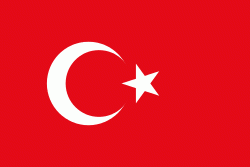Batıkent (Batikent)
Batıkent is a city near Ankara, Turkey. It is a suburban residential area located 16 km west of the city, and Ankara's largest suburb. The population is approximately 200,000, mainly middle-class families; it is a popular residential area for students and government workers. The dominant dwelling types are semi-detached and detached houses, and apartment buildings.
Batıkent was created as a cooperative housing project by Kent-Koop (Union of Batikent Housing Construction Cooperatives) to improve the quality of life for low and middle income people, mostly civil servants, traders, etc. The 1995 estimated cost of this project was approximately 43 billion dollars.
Batikent was the first mass housing project to demonstrate the success of public and private partnerships in the housing field in Turkey. It was a pioneer in bringing low income people together in cooperatives, either by place of work or through the workers' unions, to decide for themselves about the type, size and number of units in their housing projects. Housing "by the people and for the people" has affected the housing shortage in Turkey and has depressed the sale and rental prices in the Ankara housing market.
Batıkent was created as a cooperative housing project by Kent-Koop (Union of Batikent Housing Construction Cooperatives) to improve the quality of life for low and middle income people, mostly civil servants, traders, etc. The 1995 estimated cost of this project was approximately 43 billion dollars.
Batikent was the first mass housing project to demonstrate the success of public and private partnerships in the housing field in Turkey. It was a pioneer in bringing low income people together in cooperatives, either by place of work or through the workers' unions, to decide for themselves about the type, size and number of units in their housing projects. Housing "by the people and for the people" has affected the housing shortage in Turkey and has depressed the sale and rental prices in the Ankara housing market.
Map - Batıkent (Batikent)
Map
Country - Turkey
 |
|
| Flag of Turkey | |
One of the world's earliest permanently settled regions, present-day Turkey was home to important Neolithic sites like Göbekli Tepe, and was inhabited by ancient civilisations including the Hattians, Hittites, Anatolian peoples, Mycenaean Greeks, Persians and others. Following the conquests of Alexander the Great which started the Hellenistic period, most of the ancient regions in modern Turkey were culturally Hellenised, which continued during the Byzantine era. The Seljuk Turks began migrating in the 11th century, and the Sultanate of Rum ruled Anatolia until the Mongol invasion in 1243, when it disintegrated into small Turkish principalities. Beginning in the late 13th century, the Ottomans united the principalities and conquered the Balkans, and the Turkification of Anatolia increased during the Ottoman period. After Mehmed II conquered Constantinople (Istanbul) in 1453, Ottoman expansion continued under Selim I. During the reign of Suleiman the Magnificent, the Ottoman Empire became a global power. From the late 18th century onwards, the empire's power declined with a gradual loss of territories. Mahmud II started a period of modernisation in the early 19th century. The Young Turk Revolution of 1908 restricted the authority of the Sultan and restored the Ottoman Parliament after a 30-year suspension, ushering the empire into a multi-party period. The 1913 coup d'état put the country under the control of the Three Pashas, who facilitated the Empire's entry into World War I as part of the Central Powers in 1914. During the war, the Ottoman government committed genocides against its Armenian, Greek and Assyrian subjects. After its defeat in the war, the Ottoman Empire was partitioned.
Currency / Language
| ISO | Currency | Symbol | Significant figures |
|---|---|---|---|
| TRY | Turkish lira | ₺ | 2 |
| ISO | Language |
|---|---|
| AV | Avar language |
| AZ | Azerbaijani language |
| KU | Kurdish language |
| TR | Turkish language |















